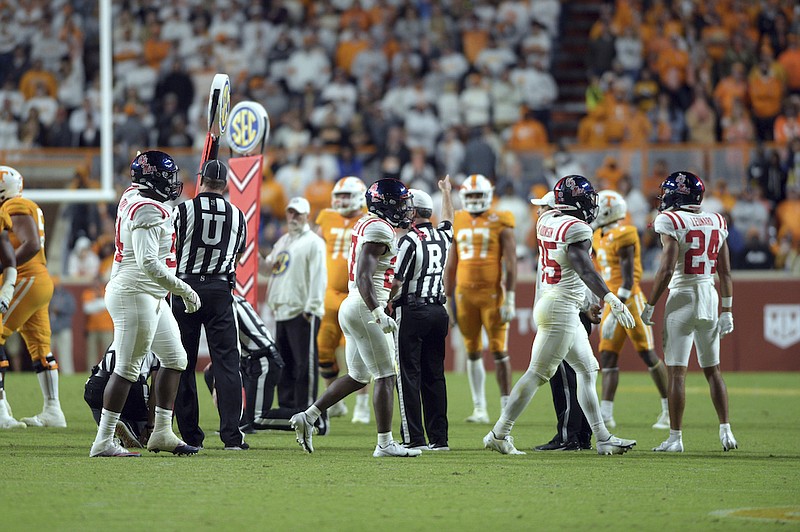Near the end of his turn at the podium during Tennessee's weekly press conference on Tuesday, UT running backs coach Jerry Mack was asked about the large number of injuries that seem to be occurring on the defensive side of the ball any time the Vols are running their high-speed offense.
If you follow football at all, especially UT football, you may have heard an opinion or three or 10 concerning what some believe to be a bit of dishonesty in an attempt to wrongly slow the Big Orange offense, especially during last weekend's 31-26 home loss to Ole Miss.
Whatever he may think in private, Mack's public answer was about as devoid of controversy as possible.
"I really don't (have a thought on it)," he said. "That's what the offseason is for. The rules committee, they'll figure out something, as far as how to progress and how to kind of fix that problem as much as possible."
At least we can hope.
And what constitutes an injury? What if you're just gassed, but you're so winded you can't breathe? What about a cramp? How long should a player be allowed to hold up play over a cramp?
There's a wonderful line in the otherwise fairly forgettable college football movie "The Program" that goes something like this: "Are you hurt or are you injured?"
The point is, everybody gets hurt in a football game. It's an always physical, often violent sport. As someone reminded me last week in an email as he recalled the matchless voice and wisdom of the NFL Films' John Facenda: "Pro football is a violent game played by violent men."
And such violence, however controlled, whether college or professional, will always lead to injuries, which are usually only healed through surgery or serious time away from the game. And injuries in general, like surgeries, are only not serious when they're happening to somebody else.
But because I'm a sports columnist, and I've been paid, however modestly, to watch and report on college football and other sports for 38 years now, allow me to offer my humble solution for how to fix this, um, "Injury Bug" that seems to plague college defenses every time they face a hurry-up, no-huddle offense these days.
No. 1 - Forget attempting to figure out if the injury is fake or not. Unless the guy falls down holding his right leg and limps to sideline favoring his left, accusing him of gaming the system may be next to impossible.
However, removing said player from the field for a certain period of time that spans more than a play or two should be considered. Strongly. More than one SEC Network talking head has suggested in recent weeks that the injured player be removed for the remainder of that series, whether it lasts three more offensive snaps or 10.
And while we're at it, we can't just make it a defensive rule. If an offensive player goes down the same remedy is enforced. You're out until you punt, turn the ball over on downs, turn it over or score.
However, because a quarterback, for instance, would never fake an injury and is crucial to his team's success - why do you think that position is so protected in the NFL that pretty much anything beyond a bear hug from behind is a 15-yard penalty against the defense? - a coach can use an "exemption card" to keep a player on the field after the current mandatory one-play-to-the-sideline rule for any and all injuries.
How would this work? Glad you asked. Every coach gets four exemption cards for each game. An extra one is issued for each overtime period.
Only catch is you can't use more than three in one half and if you use three, you're down to one in the second half, but if you use none in the opening half, you still only have three in the second.
Coaches would typically use these on quarterbacks, maybe a running back, or a linebacker. Otherwise, you're out for the series. Also, the NCAA should monitor which teams are getting the most injury stops during a game. Is there a pattern? Beyond that, consider docking the team with the injured player some time off the clock. A coach who's behind could even choose to keep a player in the game in exchange for 30 seconds lost.
Another change? Instant replay. Put a time limit on it. If you can't reverse it in 90 seconds, the original call stands. Another solution: put a sensor in the tips of every football. Run a wire under the end zone lines that's tied to a light or a horn that goes off whenever the sensors in the ball break that line. Touchdown. No question.
Will it stop the kind of deplorable behavior exhibited by at least a pretty large handful of UT fans on Saturday night when a late ball spot didn't go their way inside an otherwise magical Neyland Stadium? Possibly not. Every school has its lunatic fringe. But changes to the injury bug and replay alone would wipe clean two of the most frustrating elements out there.
Within an SEC that insists at every turn that athletics means more in this league than anywhere else, it's past time to demand that getting calls right, and playing the game the right way means more, too.
Contact Mark Wiedmer at mwiedmer@timesfreepress.com.
